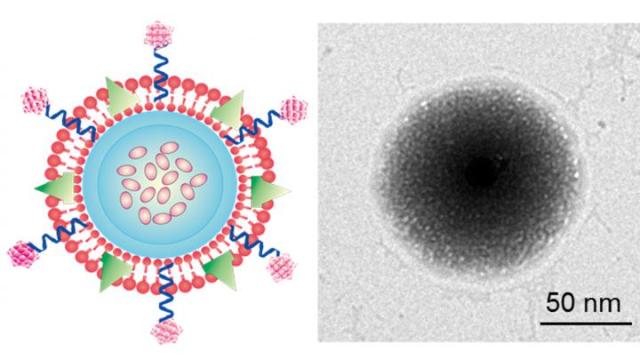Researchers have for the first time developed a technique that coats anticancer drugs in membranes made from a patient's own platelets, allowing the drugs to last longer in the body and attack both primary cancer tumors and the circulating tumor cells that can cause a cancer to metastasize. The work was tested successfully in an animal model.
 On the left is the schematic design of the TRAIL/Dox loaded platelet membrane-coated nanogel delivery system. The TRAIL is attached on the surface of membrane and Dox is loaded in the core of nanogel. On the right is a transmission electron microscope image of the drug delivery system. Black is the synthetic core nanogel, the outside shell is the platelet membrane. Credit: Quanyin Hu
On the left is the schematic design of the TRAIL/Dox loaded platelet membrane-coated nanogel delivery system. The TRAIL is attached on the surface of membrane and Dox is loaded in the core of nanogel. On the right is a transmission electron microscope image of the drug delivery system. Black is the synthetic core nanogel, the outside shell is the platelet membrane. Credit: Quanyin Hu
"There are two key advantages to using platelet membranes to coat anticancer drugs," says Zhen Gu, corresponding author of a paper on the work and an assistant professor in the joint biomedical engineering program at North Carolina State University and the University of North Carolina at Chapel Hill. "First, the surface of cancer cells has an affinity for platelets - they stick to each other. Second, because the platelets come from the patient's own body, the drug carriers aren't identified as foreign objects, so last longer in the bloodstream."
"This combination of features means that the drugs can not only attack the main tumor site, but are more likely to find and attach themselves to tumor cells circulating in the bloodstream - essentially attacking new tumors before they start," says Quanyin Hu, lead author of the paper and a Ph.D. student in the joint biomedical engineering program.
Here's how the process works. Blood is taken from a patient - a lab mouse in the case of this research - and the platelets are collected from that blood. The isolated platelets are treated to extract the platelet membranes, which are then placed in a solution with a nanoscale gel containing the anticancer drug doxorubicin (Dox), which attacks the nucleus of a cancer cell. The solution is compressed, forcing the gel through the membranes and creating nanoscale spheres made up of platelet membranes with Dox-gel cores. These spheres are then treated so that their surfaces are coated with the anticancer drug TRAIL, which is most effective at attacking the cell membranes of cancer cells.
When released into a patient's bloodstream, these pseudo-platelets can circulate for up to 30 hours - as compared to approximately six hours for the nanoscale vehicles without the coating.
When one of the pseudo-platelets comes into contact with a tumor, three things happen more or less at the same time. First, the P-Selectin proteins on the platelet membrane bind to the CD44 proteins on the surface of the cancer cell, locking it into place. Second, the TRAIL on the pseudo-platelet's surface attacks the cancer cell membrane. Third, the nanoscale pseudo-platelet is effectively swallowed by the larger cancer cell. The acidic environment inside the cancer cell then begins to break apart the pseudo-platelet - freeing the Dox to attack the cancer cell's nucleus.
In a study using mice, the researchers found that using Dox and TRAIL in the pseudo-platelet drug delivery system was significantly more effective against large tumors and circulating tumor cells than using Dox and TRAIL in a nano-gel delivery system without the platelet membrane.
"We'd like to do additional pre-clinical testing on this technique," Gu says. "And we think it could be used to deliver other drugs, such as those targeting cardiovascular disease, in which the platelet membrane could help us target relevant sites in the body."